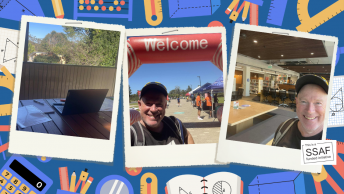This post is over three years old, the information may be outdated.
Welcome to mid-session break! It’s a chance to enjoy some down time, catch up on any subjects where you’ve fallen behind, or clarify any questions at a residential school. It doesn’t seem like a time when stress and anxiety might start getting the better of us.
But being a university student is about more than just study. We have jobs, family life, relationships, finances, not to mention our self-expectations and looming assessment deadlines – all of which are common triggers for stress and anxiety.
According to Adam Warren, Psychologist and Student Counsellor at CSU in Wagga Wagga, it’s important to recognise that the start of session can be just as daunting as the end of session.
“At the beginning of session many students are coping with the new,” he said.
“New environment, new expectations, new friends, new living arrangements – it’s new and exciting but also can be daunting as well.”
So, how do we cope when it all feels like too much and where do we find the time to take a breath and put things into perspective?
Adam says the key to reducing stress in students involves organisation and setting yourself a limit on what you can and can’t do.
“It helps to make sure [students] are organised and have effective time management routines that assist them to set priorities and study, like using a weekly time schedule or having their subjects mapped out on a calendar,” he said.
“But students should also be mindful of their own barriers and limitations and try not to overcommit themselves.”
Shaunagh Foy, Registered Psychologist and Student Counsellor at CSU in Bathurst, agrees that a balance is one of the most important aspects of reducing stress.
“Balance time with friends, balance time for study, be mindful about your habits and recognise them,” she said.
“If you’re daydreaming, where is your mind going and what are you focusing on? Procrastinating rarely works so look at what you should be doing to help you.”
As difficult as it may seem at times, sitting down and working out why we are struggling or what we are worrying about can help us move past the anxiety and do something about it.
Adam suggests writing down any negative thoughts and feelings to help recognise why you feel the way you feel and looking at these thoughts from a different perspective.
“When we recognise that our thoughts are just that, thoughts, we can begin to lower our feelings of distress attached to these thoughts,” he said.
“If you are getting down on yourself, imagine that person you are getting down on is your best friend, how would you actually speak to them? Then apply that to yourself.”
As it turns out, there are also such things as good worries. I know what you’re thinking – good worries?! Surely not!
Shaunagh recommends reminding yourself it’s okay to have some level of anxiety but to also be able to recognise if it’s interfering with everyday life – that’s the time to find some support.
“Worry is useful, we need to worry to problem solve and if we’re too laid back we’re not actually moving forward,” she said.
“But being overconfident can be a concern so questioning ourselves can keep us goal orientated and keep us thinking ahead.”
Other tips and hints include regular exercise, eating a balanced and healthy diet, maintaining a positive social life and utilising time management skills.
If you’re still feeling like your emotions are taking control, our CSU psychologists suggest speaking with friends and family for support, your subject coordinator if your stress and anxiety is study related and if need be, booking an appointment with a student counsellor.
It is important to note CSU student counsellors will not disclose personal information and are not authorised to sign special consideration forms unless they have an established and ongoing relationship with the student.









